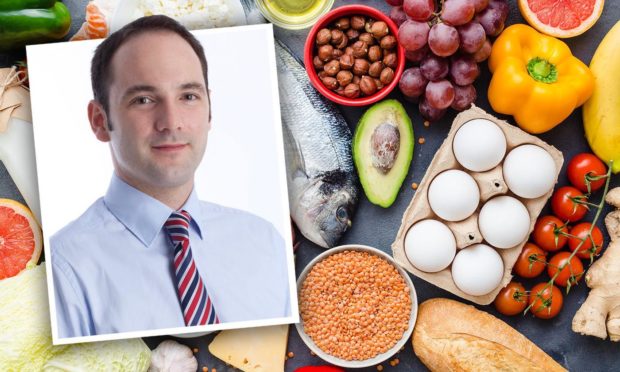Almost 1,500 young people and families from across Tayside have used their voices to shape a new healthy weight strategy aiming to reduce obesity rates across our local communities.
Launched by NHS Tayside, the new Child Healthy Weight Strategy aims by 2030 to halve the proportion of Tayside’s children who are affected by obesity.
Children were able to give their views on the barriers to healthy eating and the challenges faced particularly by young people living in poverty, which were used to inform the strategy.
Dr William Cook is a dietetic consultant in public health at NHS Tayside and worked closely on the strategy.
He says: “Child healthy weight needs to be recognised as a society wide issue, and that means everyone working together so actions are based on a true understanding of the lives of our children, young people and families in Tayside.
“Some of the feedback from children and young people included the fact that convenience of fast foods and ready meals is seen as an issue – the wide availability and easy access to these makes it too easy to eat unhealthily.
“It also included body image and the negative effects of social media, reality TV, advertising. Peer pressure affects young peoples’ perception of how they look.
“A challenge for many young people is the distance and cost of transport to activities. It’s often seen as a treat rather than the norm.
“Young people also recognised that companies widely advertise and promote unhealthy foods to make it seem appealing or cheap.”
The five ambitions
The strategy’s vision is for every child in Tayside to grow up in a supportive environment that enables them to feel healthy and ready to learn so that they can flourish.
It also aims to ensure Tayside families can eat well, drink well, be active, enjoy playing outdoors and achieve their healthiest weight.
The five main ambitions include:
• Child healthy weight is seen as a society wide issue
• Children have the best start in life
• Our environment supports healthier choices
• Families get helpful weight management support
• Families and communities in most need are our main concern
Why do we need a Child Healthy Weight Strategy in Tayside?
One of the strategy’s key aims is to reduce the “healthy weight inequality” that exists for children who grow up in poverty.
Tayside is particularly vulnerable to high rates of obesity as it is home to some of the most deprived areas in Scotland.
Dr Cook explains: “Children and young people growing up in more deprived areas are twice as likely to become overweight.
Tayside Child Healthy Weight strategy launched. The strategy launch, which was held online, brought together people who were involved in the development of the strategy as well as those who will be critical in its implementation. Read more here – https://t.co/oE8nKn7l2U
— NHS Tayside (@NHSTayside) June 25, 2021
“We know that around one in four Primary 1 children in Tayside are at risk of obesity. This picture has not changed over the last 20 years and too many children are exposed to and eat food that is high in energy, fat, sugar and salt.
“Causes of this lie in almost every aspect of our social system. They link to poverty and employment, housing, transport, advertising and much more.
“This makes it harder for children, young people and their families to eat well, drink fewer sugary drinks and be more active on a daily basis.”
What is the link between obesity and poverty?
The strategy highlights the link between obesity and poverty, with those living in areas of high deprivation more likely to be obese.
According to Public Health Scotland:
- Risk of obesity in children is lowest for those living in more affluent areas.
- Around 32% of adults living in the most deprived areas are obese, compared with 20% of those living in the least deprived areas.
- Women and children in the most deprived areas are particularly affected by more extreme obesity.
Dr Cook continues: “Living in poverty, or ongoing food insecurity, is associated with high levels of stress, meaning people may not have the mental energy to make choices or dedicate time and effort to cooking and preparing nutritionally balanced meals.
“Issues like this need to be addressed so that parents have the money, time and mental energy to support their children.”

